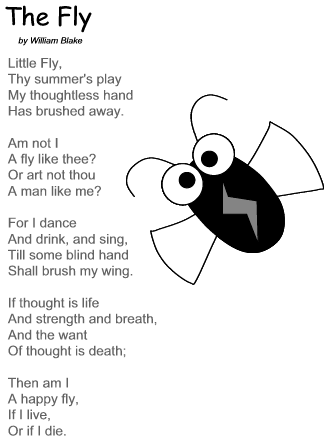THE FLY
William Blake
About Poet William Blake
William Blake (1757-1827) was an English poet, artist, and visionary who is considered one of the most significant figures of the Romantic era. Blake's work was marked by his rejection of traditional Enlightenment values, his interest in mysticism and the supernatural, and his belief in the power of the imagination. Blake's poetry was characterized by his use of vivid imagery, bold symbolism, and a highly individualistic and idiosyncratic style. His most famous works include "Songs of Innocence" and "Songs of Experience," which explored themes such as childhood, innocence, and the corrupting influence of society.
Poem Analysis
William Blake's The Fly is a short, yet powerful poem that explores life's fleeting nature, death's inevitability, and existence's beauty and fragility. First published in 1794 as part of his collection "Songs of Experience," the poem uses the image of a fly to symbolize the transience of life and the human struggle to find meaning in the face of mortality.
The poem begins with the speaker observing a fly, which is struggling to escape from a window pane. The fly's movements are erratic and desperate, and it seems to be driven by a sense of urgency and panic. The speaker then begins to reflect on the fly's brief existence and the futility of its struggles, remarking:
"Am not I A fly like thee? Or art not thou A man like me?"
Here, the speaker draws a parallel between the fly and himself, suggesting that both are subject to the same laws of nature and the same fate. This comparison highlights the universality of the human experience and the fact that all living beings must face the inevitability of death.
The poem then takes a darker turn as the speaker crushes the fly, bringing an abrupt end to its struggles. This act of violence is sudden and unexpected, and it seems to echo the arbitrary and unpredictable nature of death. The speaker then reflects on the fragility of life, remarking:
"For I dance And drink and sing, Till some blind hand Shall brush my wing."
Here, the speaker acknowledges the fleeting nature of life and the fact that it can be taken away at any moment. The image of the "blind hand" suggests the randomness of death and the fact that it can strike without warning.
Despite its bleak themes, "The Fly" is a beautiful and poignant poem that encourages us to appreciate the beauty and wonder of life, even in the face of mortality. By using the image of a fly to symbolize the human condition, Blake highlights the fragility and transience of life, while also celebrating its beauty and complexity.
Overall, "The Fly" is a powerful meditation on the human experience and a reminder that life is both precious and fleeting. It urges us to embrace the present moment and to find meaning and purpose in our brief time on earth, even in the face of the inevitability of death.
Figures of speech in William Blake's poem "The Fly"
- Metaphor: The speaker compares himself to the fly, saying, "Am not I a fly like thee?" This metaphor highlights the idea that all living beings are subject to the same fate, regardless of their status or importance.
- Personification: The fly is personified throughout the poem, with its struggles and movements described in human terms. For example, the fly is said to "mark its way with an inconstant wing" and to "wear its fretful wings." This personification serves to emphasize the fly's vulnerability and fragility.
- Symbolism: The fly is used as a symbol for the transience of life and the inevitability of death. By using the fly as a metaphor for the human condition, Blake is able to explore themes of mortality and the fleeting nature of existence.
- Allusion: The line "And are not you and I/But men like all the flies" contains an allusion to the Christian concept of the fall of man, which suggests that all human beings are subject to sin and mortality.
- Irony: The final line of the poem, "For I dance/And drink and sing/Till some blind hand/Shall brush my wing," is ironic in that it suggests that the speaker is enjoying life, even as he contemplates his own mortality. The irony serves to underscore the theme of the poem, which is the tension between the joy of life and the inevitability of death.
Thanks for visiting I hope it is useful.






No comments:
Post a Comment